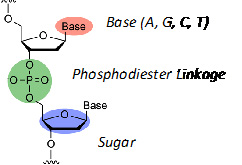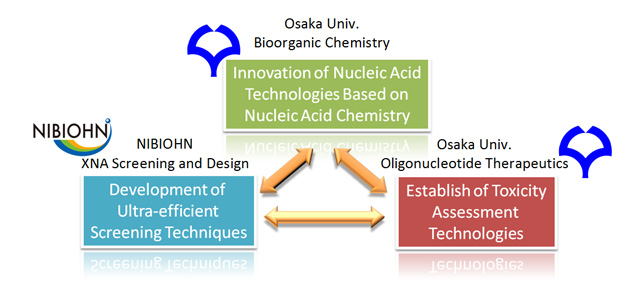<Figure1>Structure of Nucleic Acids
Nucleic acids consist of three parts, base, phosphodiester linkage and sugar, and various chemical modifications have been made on these moieties.
HOME > Research and Development Projects Adopted in FY2014 > Building a Platform for Innovative Non-Toxic Oligonucleotide Therapeutics –Synthesis, screening, and evaluation of dual-modified artificial nucleic acids–
Project Leader:Obika Satoshi
Professor, Graduate School of Pharmaceutical Sciences, Osaka University

Oligonucleotide therapeutics differ from conventional medicines in that they can inhibit the intracellular expression of certain genes, giving rise to expectations of innovative new drugs that can treat intractable diseases. Chemically modified artificial nucleic acids are essential in the development of oligonucleotide therapeutics. Improved in vivo stability (resistance to nuclease) and enhanced binding affinity to target mRNA have been crucial in oligonucleotides used in drugs, and artificial nucleic acids that can satisfy these requirements are being developed. The structure of nucleic acids can broadly be classified into base, phosphodiester linkage and sugar moieties (Figure 1), and various chemical modifications have been investigated for these moieties, resulting in the discovery of artificial nucleic acids that meet the above-mentioned requirements. However, progress in nucleic acid research aimed at human clinical trials has also uncovered new issues that need to be resolved. Technologies required to realize practical applications for oligonucleotide therapeutics include effective delivery systems for artificial oligonucleotides, efficient sequence screening techniques for drug candidates, and technologies for preventing potential toxicity of artificial oligonucleotides. Among these, delivery systems in particular have undergone recent advances in response to research aimed at the enhanced functionality and practical application of oligonucleotide therapeutics. The lack of established screening techniques, however, has meant that the search for sequences is still reliant on researcher rule of thumb and computational science. Additionally, the search for techniques to prevent toxicity in artificial oligonucleotides is currently hampered by inadequate understanding of most mechanisms of toxicity. In order for Japan to raise the level of research and development in oligonucleotide therapeutics and bolster its global competitiveness, it is essential to fast track the development of efficient sequence screening techniques for drug candidates and technologies for preventing potential toxicity of artificial oligonucleotides by maximizing the application of nucleic acid chemistry in which Japan has been a global leader.
Our research aims to create a platform for non-toxic oligonucleotide therapeutics through the development of dual-modified artificial nucleic acids involving the chemical modification of both base and sugar moieties (Figure 2). Focusing on innovative artificial nucleic acid technologies grounded in nucleic acid chemistry (Osaka University), we will develop screening techniques capable of ultra-efficient identification of promising seeds from numerous drug candidate sequences (National Institute of Biomedical Innovation, Health and Nutrition), and toxicity assessment technologies to ensure the safety of oligonucleotide therapeutics with a high level of reliability (Osaka University). Through the promotion of these three core technologies, we intend to realize the creation of innovative nucleic acid discovery platform technologies with the potential to become the new global de facto standard in oligonucleotide therapeutics development (Figure 3).

Nucleic acids consist of three parts, base, phosphodiester linkage and sugar, and various chemical modifications have been made on these moieties.

This project aims to create a platform for non-toxic oligonucleotide therapeutics through the development of dual-modified artificial nucleic acids.

Our research groups work in close cooperation with each other to realize the creation of innovative nucleic acid discovery platform technologies as the new global de facto standard in oligonucleotide therapeutics development.